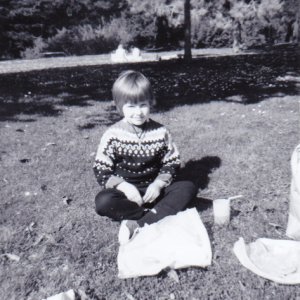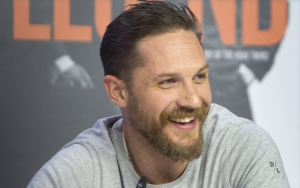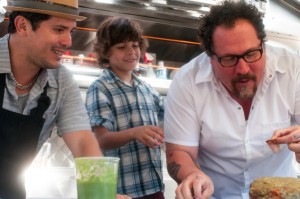Some film score composers have styles so distinctive that one can tell from hearing just a few measures of one of their compositions exactly who wrote it. Danny Elfman’s bold, busy, occasionally bombastic scores for Tim Burton’s movies have a particular power and energy, and it’s hard to imagine Alfred Hitchcock’s films without Bernard Herrman‘s sweeping, urgent orchestral pieces. Randy Newman’s scores usually have a bit of his trademark ragtime shuffle somewhere, and sometimes a touch of Aaron Copland to them, and Randy’s cousin, the fellow film-score-composer Thomas Newman, has his own compositional quirks that often make his work especially compelling and recognizable. His penchant for odd instruments, time signatures and percussion make his compositions unlike anyone else’s.
The scores of Thomas Newman are distinctive in their use of unusual time signatures, heavily percussive instrumentation and unrecognizable sounds created by his collection of rare instruments, all layered together in rich and unexpected ways. His scores have included the sounds of the zither, hurdy-gurdy, psaltery and hammered dulcimer, aboriginal chants, and even the chirping of cicadas. He weaves synthesizers and lush string arrangements in among the more organic sounds, and alters his sonic findings to create aural oddities that nobody has heard before.
Newman’s theme to the groundbreaking HBO television series Six Feet Under was created primarily with recognizable instruments—strings and reeds, for example—that are overlaid with washes of dissonant, shimmering, zithery sounds that remind one of harp glissandi but aren’t. They are then warmed by melodic oboe lines and set off by strange background sounds similar to the low squeaks one accidentally makes when rubbing wet wine glasses in a tub of suds. For the film WALL•E, Newman collaborated with Peter Gabriel to create the Oscar-nominated song “Down to Earth,” a perfect melding of synthesized, metallic, otherworldly sounds and rich, earthy, very human voices. The song sounds at once very much like Newman while being perfectly in sync with Gabriel’s body of work, and is a delicious auditory morsel that’s quite an appropriate accompaniment to the story of the film.
Newman has worked extensively with the innovative director Sam Mendes, and his haunting and anxiety-provoking scores provide powerful backdrops for all but one of Mendes’s angst-filled films. These include Spectre, American Beauty, Road to Perdition, Revolutionary Road, Skyfall and Jarhead. It is also hard to imagine the moody and intense Frank Darabont films The Shawshank Redemption and The Green Mile without the oppressive sonic blankets that Newman created to press down on us and make us feel the fear and claustrophobia inherent to prison life.
Often Newman draws out discordant musical phrases and refuses to resolve them, leaving us feeling perplexed, nervous and worried. His theme to Revolutionary Road is a simple, repetitive piano tune layered with cymbals and repeating string lines that serves to build a deep reservoir of pain that cannot be released, just as the film does. Hopeful woodwinds peek up among the swirling strings at times, like a drowning swimmer trying to rise up for air before sinking below the surface one last time. The piece “Road to Chicago” from the intense and underrated Sam Mendes film Road to Perdition also begins with a simple piano motif, but then it hums with danger as washes of strings begin to press down on the piano tune. We wait for the chords to resolve but they only recede, pulling us far down a lonesome road, fading like the lights on a car driving into a dark, cold night.
The score for Jarhead brims with the intensity and violence of war, jolting the audience to attention with discordant Middle Eastern-sounding motifs played on stringed instruments mingled with synthesizers and insistent percussion, the unrecognizably altered sounds stirring fear in our hearts and melting our brains like waves of heat in the deserts of the Persian Gulf.
Born in 1955, Newman is the son of legendary composer and conductor Alfred Newman, who was the composer of scores for over 200 films and the winner of nine Oscars, an achievement that no other film composer has ever matched. Thomas has himself been nominated for (but not won) twelve Oscars and has won two BAFTAs, six Grammys and an Emmy. While he is best known for his film work, he was first interested in musical theater, just as his father had been, and while he was at Yale young Thomas was mentored by Stephen Sondheim. He then moved to Hollywood to follow in the footsteps of his father and his celebrated uncle Lionel Newman, another major player in Hollywood history who himself composed scores for over 200 films as well as a number of classic TV show theme songs. Another uncle, Emil Newman, was also an accomplished Hollywood conductor of long standing.
Newman’s work, like that of his frequent collaborator Sam Mendes, is as unsettling as it is beautiful. Both are intended to push us out of our comfort zones, nudging us to see something stylish and beautiful among the shadows and ruins. Mendes’s work uncovers the sinister forces lurking near us and sometimes within us, and his films ask us to stare uncomfortably at the black cracks in our own psyches. Newman’s music is like the dark music that rises from those cracks—haunting, frightening, altogether new yet somehow familiar. His music and Mendes’s films also present to us a painful yearning and loneliness that can seemingly never be filled. That hollow, empty quality is what makes their darkest works so frightening yet so brilliant, so recognizable and unfathomable all at once. They are dark masters and their creations are dangerous gems.



